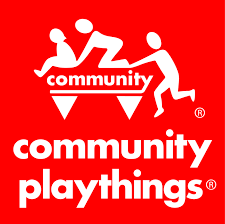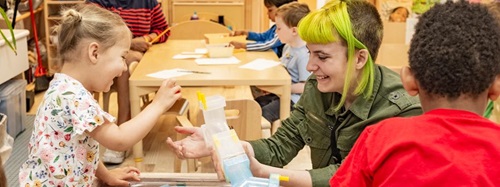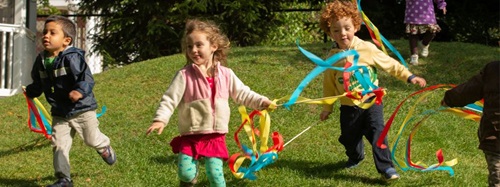The Earlier the Better?
Why pushing academics on young children is counterproductive.
| February 2024Early education consultant Rae Pica’s book What If Everybody Understood Child Development? Straight Talk About Bettering Education and Children’s Lives pulls together 29 short essays on critical topics in child development and education. The following essay from Part 1, “Understanding Children,” explores how introducing academics and elementary education earlier has infiltrated early education, to the detriment of children.
A mother told me her son was seven months old when she first felt the pressure to enroll him in enrichment programs. She said, “Here I was with an infant who had just learned to sit upright by himself, and someone was asking me what classes he was going to be taking, as if he were ten!”
Another mom, an early childhood professional who understood child development, complained to me that she was under tremendous pressure to enroll her daughter in the local, competitive soccer program. When I asked her daughter’s age, she replied, “Two and a half.”
A few years back, the San Francisco Chronicle told the story of one woman who called a popular preschool to say she was thinking about getting pregnant and wanted to put her baby-to-be on the school’s waiting list. I learned of another mother who enrolled her child in “preschool prep”—at four months old. ABC Nightline reported the story of a mom so determined that her daughter get into a “prestigious” preschool that she wrote to the Vatican, asking them to pen a letter of recommendation for the child’s application.

What all of these stories—and many, many others like them—have in common is the belief that earlier is better. You just can’t start kids too soon on the road to success. And it’s not just parents who believe it. As stated by Nancy Bailey in an article titled “Setting Children Up to Hate Reading”:
"Politicians, venture philanthropists, and even the President, make early learning into an emergency. What’s a poor kindergartener or preschooler to do when they must carry the weight of the nation on their backs—when every letter and pronunciation is scrutinized like never before?
Unfortunately, many kindergarten teachers have bought into this harmful message. Many have thrown out their play kitchens, blocks, napping rugs, and doll houses believing it is critical that children should learn to read in kindergarten!"
Kindergarten, according to studies from the American Institutes for Research and the University of Virginia, has become “the new first grade.” And, based on my observations, preschool has clearly become the new kindergarten. The directors and teachers in private preschools all around the country tell me that parents are putting increasing pressure on them to switch from play-based to academic-oriented curriculums. If the schools don’t submit to the parents’ wishes, they risk losing enrollment to those schools that do favor early academics.
The belief that earlier is better has become deeply ingrained in our society—whether we’re talking about academics or athletics. Parents are terrified that if they don’t give their little ones a jump-start on the “competition,” their children will fall behind and end up as miserable failures. Politicians pander to the ridiculous notion that education is a race. And teachers—from preschool to the primary grades—are being forced to abandon their understanding of what is developmentally appropriate and teach content they know to be wrong for kids.
And what happens to the kids? They’re too often stressed and miserable. Depression among children is at an all-time high. Children taught to read at an early age have more vision problems, and those taught to read at age five have more difficulty reading than those taught at age seven.
And of course, reading isn’t the only skill children are being asked to acquire too early; requirements in all content areas have risen as curriculum is “pushed down” from higher to lower grades. Anxiety rises as children fail to meet their parents’ and teachers’ expectations—because they’re developmentally incapable of doing what’s asked of them. All of this does nothing to endear them to learning.

On the athletic side, when foot-eye coordination isn’t fully developed until the age of nine or ten and children just barely beyond the wobbling stage are being asked—no, obliged—to play soccer at practically professional levels, they’re also set up to fail. Children asked to catch a small white ball hurtling through the air at them before their visual tracking skills are fully formed learn not to catch but to become fearful. Children whose growing muscles, joints, and bones are stressed beyond what should be expected of them risk injury—sometimes lifelong injury. All of this does nothing to endear them to physical activity.
So, whether we’re talking about moving or learning, two things' children are born loving, the end result is often the same: loss of motivation. Demanding that children perform skills for which they’re not yet ready creates fear and frustration in them. Moreover, children who are “trained” by adults to develop at a pace that is not their own tend to become less autonomous people.
And here’s the punchline: child development cannot be accelerated. Moreover, there’s no reason to try to accelerate it. The research shows that usually by third grade, and certainly by middle school, there’s no real difference in reading levels between those who started reading early and those who started later. The research shows that children who begin in sports when they’re developmentally ready catch up to and even surpass those who started early.
As to the play-versus-academics debate in early learning, studies have also determined that children enrolled in play-oriented preschools don’t have a disadvantage over those who are enrolled in preschools focusing on early academics. One study, in fact, showed that there were neither short-term nor long-term advantages of early academics versus play and that there were no distinguishable differences by first grade. In another study, fourth graders who had attended play-oriented preschools in which children often initiated their own activities had better academic performance than those who had attended academic-oriented preschools.
But no one in charge is paying attention to the research. Given that, here are some of the concerns I have:
- What’s to ensure children won’t be burned out from all the pushing and pressure before they’ve even reached puberty?
- If we’ve caused them to miss the magic of childhood, how will kids ever find the magic necessary to cope with the trials and tribulations of adulthood?
- What will become of the childlike nature adults call upon when they need reminding of the delight found in simple things—when they need to bring out the playfulness that makes life worth living?
- At what cost will all of this “pushing down” come?
Childhood is not a dress rehearsal for adulthood. It is a separate, unique, and very special phase of life. And we’re essentially wiping it out of existence in a misguided effort to ensure children get ahead.
When did we decide that life was one long race? When, exactly, did life become a competition?
What’s a Teacher to Do?
- Just say no. As I like to tell my audiences, there are more of us than them. We have the power—including the political power—to stop the insanity. Become involved in policy at whatever level you can. Sign online letters and petitions addressed to policymakers. Use social media to express your views about developmentally inappropriate practice. Join forces with groups such as Defending the Early Years because there’s power in numbers in doing so. Refuse to vote for senators, congresspersons, governors, mayors, or school board members who do not support good education policy and practice.
- Invite policymakers to your classroom to see what developmentally appropriate instruction and learning look like.
- Get parents on your side. Educate them about the fallacies behind the belief that earlier is better. Don’t be shy about pointing out the potential problems inherent in trying to hurry child development.
- Despite what’s happening around you, plan your curriculum and use teaching practices based on the research, not on the nonsense being promoted by those who don’t know any better.
Where to Learn More
- Listen: “Teaching Reading: When Is Too Early, When Is Too Late?” (BRN Radio)
- Listen: “Is Your Child Developing Normally?” (BRN Radio)
- Read: Defending the Early Years
- Read: "A Very Scary Headline about Kindergartners"
- Read: "Setting Children Up to Hate Reading"
Check out Rae Pica's book here.








